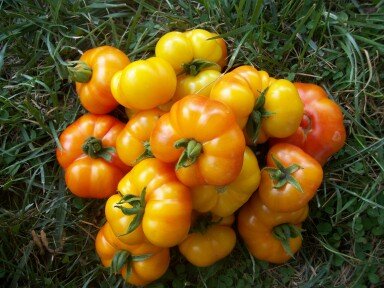 Image 1 of
Image 1 of


Al Kuffa Tomato (Iraq)
(Solanum lycopersicum) An Iraqi heirloom first introduced in the U.S. in the 90s by Iraqi seed saver Aziz Nael. Sturdy compact determinate plants which provide a steady stream of small (2-4 oz) cocktail-sized fruit. The fruit has a mild flavor, and is distinctly on the drier side, like plum tomatoes, making it well suited for the classic regional salad of chopped tomatoes, cucumber, parsley, onion, and radish. For an heirloom crop these plants are fairly disease resistant and reliably productive. Can be grown in 5-gallon containers.
These seeds were cultivated by the Iraqi Seed Collective, a group of diasporic people of Mesopotamian heritage who are saving seeds to uplift and preserve ancient culture from the fertile crescent.
(Solanum lycopersicum) An Iraqi heirloom first introduced in the U.S. in the 90s by Iraqi seed saver Aziz Nael. Sturdy compact determinate plants which provide a steady stream of small (2-4 oz) cocktail-sized fruit. The fruit has a mild flavor, and is distinctly on the drier side, like plum tomatoes, making it well suited for the classic regional salad of chopped tomatoes, cucumber, parsley, onion, and radish. For an heirloom crop these plants are fairly disease resistant and reliably productive. Can be grown in 5-gallon containers.
These seeds were cultivated by the Iraqi Seed Collective, a group of diasporic people of Mesopotamian heritage who are saving seeds to uplift and preserve ancient culture from the fertile crescent.
(Solanum lycopersicum) An Iraqi heirloom first introduced in the U.S. in the 90s by Iraqi seed saver Aziz Nael. Sturdy compact determinate plants which provide a steady stream of small (2-4 oz) cocktail-sized fruit. The fruit has a mild flavor, and is distinctly on the drier side, like plum tomatoes, making it well suited for the classic regional salad of chopped tomatoes, cucumber, parsley, onion, and radish. For an heirloom crop these plants are fairly disease resistant and reliably productive. Can be grown in 5-gallon containers.
These seeds were cultivated by the Iraqi Seed Collective, a group of diasporic people of Mesopotamian heritage who are saving seeds to uplift and preserve ancient culture from the fertile crescent.

